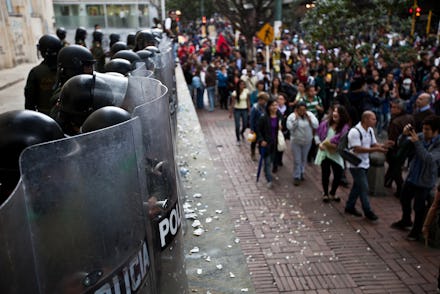Thousands Are Protesting to Support Their Ousted Mayor. Here's Why.

Tens of thousands of protesters gathered in the streets of Bogotá on Friday in solidarity with their recently ousted mayor, Mayor Gustavo Petro, a demonstration that supports peace building efforts in Colombia.
Colombian Inspector General Alejandro Ordóñez called for the expulsion of Bogotá Mayor Petro from office after accusing him of mismanaging the city's sanitation, BBC News reports.
Deposed Petro, a former leftist rebel with the Bolivarian 19th of April Movement (M-19), argues the move was a "right-wing coup" by the inspector general. He was subsequently outlawed from running for a government position for 15 years.
Petro managed to garner support from tens of thousands of protesters who demonstrated at the Colombian capital's Bolivar Square on Friday, representing several social sectors of Bogotá, including students, teachers, and even farmers. He says he is going to fight to change the ruling.
"I remain the mayor of Bogota … we have governed with zero corruption," Petro said in a local television station program, according to The Guardian.
Petro posted on twitter that his "coup d'état" removal by Ordóñez will undermine peace talks in Havana between President Juan Manuel Santos and the Marxist-Leninist FARC-EP (Revolutionary Armed Forces of Colombia – People's Army), backtracking recent substantial progress made in attempting to eliminate an almost 50-year-old civil war. Consequently, the FARC released a statement from Havana mentioning Petro's removal from office as an "attack on democracy" and a "message of war," which are the main criticisms made against the government's relationship with rising leftist politicians since the enigmatic assassination of populist leader Jorge Eliécer Gaitán Ayala in 1948.
"With a simple signature, Ordoñez gave those if use who have risen up in arms a lesson in what democracy means to the oligarchy in Colombia," the FARC said in a statement, The Christian Science Monitor reports.
Many Colombians, including 63 percent of those living in Bogotá, are against Ordóñez's decision for three main reasons.
First, Petro's removal from office is likely to stir up trouble between guerrillas and the stalwart conservative officials in government attempting to make peace negotiations because of the guerillas' sympathy with the ousted mayor's tackling of animal abuse, discrimination of LGBT, racial marginalization, and urban poverty. Any steps taken backward in the peace-building process between the guerrillas and conservative officials will seem like a failure to millions of Colombians who are exhausted from almost five decades of violent conflict.
Second, in the minds of many in Colombia, Petro's time in office represents a reconciliation of both the values of more radical leftist groups in Colombia who promote attempts made at the redistribution of wealth and elected officials who have denounced guerrilla crimes under the banner of egalitarianism. Petro has openly criticized both the FARC and former President Álvaro Uribe, who is rumored to have ties with violent right-wing paramilitary groups.
Lastly, this is not the first time Ordóñez has removed a leftist politician. The inspector general eliminated renowned leftist leader Piedad Córdoba from Colombia's Senate and outlawed her from running for a government position for 10 years. Córdoba, who made public her friendship with deceased Venezuelan President Hugo Chávez, was accused trying to aid the FARC, The Guardian also reports.
Overall, hundreds of thousands of protesters in Bogotá have sided with Petro because of the effects the conservative ouster's decision will have on the peace-building process between the FARC and government, Ordóñez's history of targeting leaders who promote social equality, and because of the ousted mayor's vision of a more egalitarian Colombia that many far-right government officials do not share.